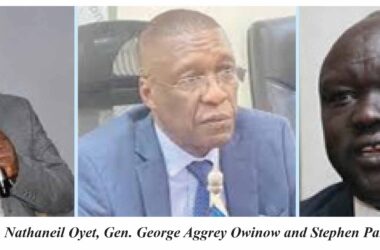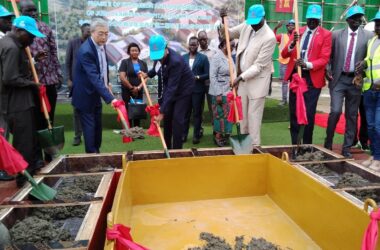By Mamer Abraham
South Sudan’s Auditor General calls for proper sharing of oil revenue with rightful beneficiaries.
Mr. Stephen Kiliona Wondu made the call to the concerned petroleum ministries and stakeholders.
He asks authorities in Unity, Upper Nile States, and Ruweng Administrative Area to know the rightful shares of the oil revenue and ensure appropriate payment.
“You have to know your share of the oil revenue. You are told that it is two percent for this village, three percent for that; three percent of what?” he interrogated.
The Auditor general tasked the leaders to know the gross amount from which the community, the area, and the county, are supposed to get two percent.
“Two percent of ten is different from two percent of eight,” he lamented.
He urged the council of states to strictly follow up to ensure that the payments made to the petroleum-producing areas are paid in accordance to the law.
Wondu said the money should be paid to a protected account without access from third parties.
“It should be ring-fenced; it must have a stronghold against it,” he insisted.
The Chief auditor disclosed that at one time oil money was deposited into the accounts of the beneficiaries but later withdrawn by ministry of finance.
“When the ministry of finance found itself in need of cash, it went to the same place and took the money again away,” he divulged.
The auditor general further warned the youth and leaders not to forget the future, by serving their people without devising fraudulent practices.
“Never forget to think about tomorrow. What you sip today matters tomorrow. Save for the rainy day because there is always a rainy day,” he echoed.
He warned commissioners, chief administrators, police, chiefs, women leaders, and youth, against stealing from their own people.
“It is immoral, it is unethical; lead your people, help your people,” he advised.
Faulty act
During the workshop, Ariic David, an economist at the Sudd Institute, stated in his presentation at the Third High-Level Meeting on Environmental Issues and the status of the five percent oil revenue sharing that the calculations of sharing were faulty.
Ariic said the payments that were disbursed to the petroleum-producing states were wrongfully drawn from the net oil revenue instead of the gross oil revenue, and therefore the states had been deprived of a staggering $ 943 million.
He said the oil-producing communities that were entitled to a three percent oil share were owed $573 million by oil companies from 2011/12 to 2022/2023, while the communities neighbouring oil-producing states were owed $370 dollars.
“The producing communities are owed a cumulative total of 573 million dollars. The time period is 2011/12 to 2022/23. Similarly, for two percent parse, not also calculated well, the oil-producing states are owed 370 million dollars equivalent,” Ariic explained in his research presentation.
The economist argued that the Act was not implemented intentionally by some senior members of the government oversight committees for their personal gains.
“The Petroleum Revenue Management Act is clear, but it is not being used properly intentionally. The calculation is wrong. The three percent share has not been properly disbursed to petroleum-producing communities as per my calculations,” he argued.
Oliver Denis, a technical consultant at the Ministry of Petroleum, admitted there was confusion in the act related to the gross and net petroleum revenue.
“…and I will also include some examples just to clarify a few points on the study that was done by Sudd Institute in terms of calculations because there is a bit of confusion between the gross petroleum revenue and the net petroleum revenue,” he continued.
The representatives of the oil-producing states and administrative areas said their oil revenue shares had been delayed for up to three months, and sometimes when a payment is skipped, it will not be made again.
On Tuesday, Vice President for Service Cluster Hussein Abdelbagi Akol warned that the committee members who were misusing the oil revenue allocated to the states for their personal gains would be punished.
The vice president said the government should formulate policies aligned with the Petroleum Revenue Management Act for transparent and accountable management of oil revenue.




